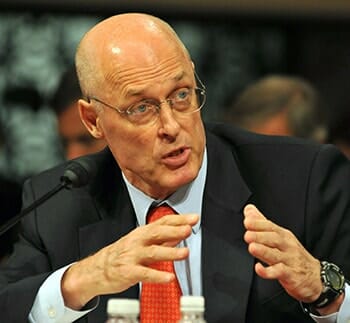
Hank Paulson says China needs $1 trillion for green cities
One trillion dollars (RMB6.6 trillion) will be needed to support China’s efforts at reducing carbon emissions in the next five years, and former US Treasury Secretary Hank Paulson is leading cross-border efforts to provide the know-how and financial backing to reach this goal.
The Paulson Institute, which is led by the former US official and Goldman Sachs CEO, has teamed up with former New York mayor Michael Bloomberg, and a host of Chinese agencies to set up the Building Energy Efficiency and Green Development Fund.
The fund, kicked off its first projects this month, aims to fuse US green building technologies, with a transnational funding consortium, to make China’s cities more efficient.
“The Paulson Institute is pleased to support this unique cross-border public-private partnership, which I believe can marry the best of U.S. technology, know-how, and experience with Chinese creativity, market scale, and rapid commercialization,” said Henry M. Paulson, Jr., chairman of the non-profit Paulson Institute, which helped convene the participants in the project.
Funding for the campaign, which is expected to cost the equivalent of a tenth the mainland’s current GDP, will be used to invest in efficient buildings, low-carbon transportation and clean energy in Chinese cities.
First Projects Set for Jiangsu and Hebei Provinces

Gucci’s LEED Platinum store at Swire’s Daci Temple project in Chengdu
The first projects under the new fund were officially launched on June 16th at a ceremony organised by the Paulson Institute and China’s Office of the Central Leading Group for Financial and Economic Affairs.
With buildings accounting for 40 percent of total global carbon emissions according to Paulson Institue findings, five Letters of Intent were signed at the ceremony to create five green building projects in Zhenjiang in Jiangsu province and Zhangjiakou in Hebei. In Zhenjiang the Paulson Institute, which is working with local governments to implement the projects, say that the consortium will invest in energy efficiency upgrades of major existing industrial enterprises, as well as improving commercial and residential heating systems in the Yangzte River Delta city.
“These projects are expected to explore the optimal channels and effective models for green finance cooperation among our two counties, so as to lay a solid foundation for further and comprehensive cooperation in the future,” said Liu He, Minister of the Office of the Central Leading Group on Financial and Economic Affairs.
Project Launches Follow Bloomberg-Funded Report
A report published by the Paulson Institute in April of this year estimates that China will need to invest RMB 1.65 trillion ($254 billion) in the 13th Five-Year-Plan period to support construction of greener buildings and the large-scale retrofits of existing houses and commercial buildings.
On the basis of its research, which was supported by Bloomberg Philanthropies and the Green Finance Committee of China Society for Banking and Finance, the Institute recommends leveraging public/private partnership models because of the mounting credit risks from overreliance on local governments to finance infrastructure projects.
Leave a Reply